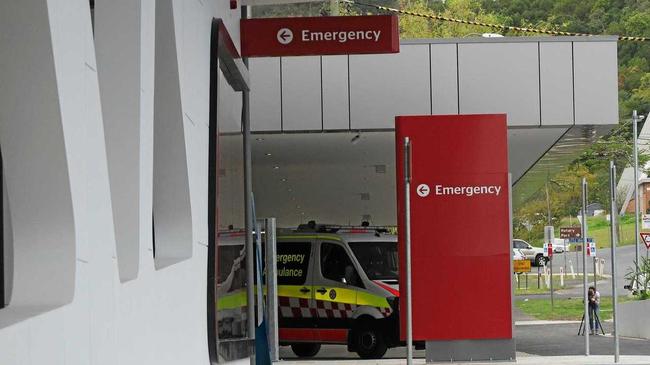Family 'grateful' to doctor who tried to save chef's life
THE court has heard there was "no alternative" to the 23-year-old being restrained face down, given the circumstances.

Lismore
Don't miss out on the headlines from Lismore. Followed categories will be added to My News.
UPDATE 5.32pm: LOVED ones of a young chef wept in court as lawyers conveyed their thanks to a doctor involved in his care before he passed away in hospital isolation room in 2016.
Tristan Francis Naudi, 23, died at Lismore Base Hospital on January 18, 2016, after he consumed what he believed was LSD and suffered "an acute drug-induced behavioural disturbance".
A toxicology report found there was only MDMA and MDA detectable in his system.
The inquest into his death - which has so far been held in Byron Bay this week - has heard from four doctors who restrained Mr Naudi in the isolation room.
Police had been called to Mr Naudi's Bangalow home, initially due to his agitated and aggressive behaviour and while an ambulance was also tasked with attending, police were instructed paramedics would not transport Mr Naudi due to his violent behaviour, which the court has heard was uncharacteristic of the 23-year-old.
Dr Rhiannon Edwards, who administered antipsychotic medication droperidol followed by the sedative diazepam to Mr Naudi before he became unresponsive in the hospital, appeared via video link from the UK yesterday.
Dr Edwards was expected to appear as a witness but counsel assisting the coroner Donna Ward said the parties had agreed they would ask no questions of her and would instead view part of her recorded interview.
While the doctor appeared before court, lawyers instead took the opportunity to thank her on behalf of Mr Naudi's family.
Dr Edwards and some of Mr Naudi's loved ones wept throughout this.
The court heard his death "came as a great shock", but that Mr Naudi's loved ones were "grateful" for Dr Edwards' care and support which "did not go unnoticed".
In a recorded interview with Dr Edwards which was played to the court, she recalled noticing his chest cavity was not moving, either during or just after administering the diazepam.
She told the police officers to turn him over and CPR was attempted for about 25 minutes, the court heard.
The court also heard from Dr Lindsay Murray, who in charge of the emergency department that night.
The court recalled Mr Naudi was already inside the department's isolation room - restrained by four police on a mattress on the floor - when he entered.
Dr Murray said he had hoped to observe the patient being brought into the hospital, but this didn't transpire.
Ms Ward asked if their plan had "failed" because of this.
"I just wanted to be there because I was the senior doctor and it was my responsibility," Dr Murray said.
Ms Ward asked what would be the "medical consequences for Tristan" if he had not been restrained.
"You would be unable to insert the cannula and get him sedated," Dr Murray said.
"There was a risk of ongoing physical damage (to himself)."
The court earlier this week heard Mr Naudi had fallen head-first from a van outside his Bangalow home prior to police arriving.
Dr Murray explained sedating the patient was their key priority at the time, and other care - including consideration of his very high body temperature - would come after he had been calmed.
Dr Michael Karpa, who inserted the cannula, told the court he saw two police officer's knees pressed on the patient's back.
During cross-examination he conceded it was possible this involved just one knee.
When lawyer for the police Hayley Bennett asked Dr Karpa whether he was confused about his recollection, given concessions he may have mistaken the gender and ethnicity of some officers, he said: "I'm not feeling confused about what I'm saying, no".
But the court had heard conflicting evidence from medical staff and police that they had no recollection of weight being placed on Mr Naudi's back while he was in the isolation room.
The inquest will continue in Lismore tomorrow and Friday.
Original story: AN INQUEST has heard from the doctor who was overseeing the emergency department where a Bangalow man died suddenly in 2016.
The third day of the inquest into the death of 23-year-old Tristan Francis Naudi is being held before the Coroners Court in Byron Bay today.
After taking what he'd thought was LSD, Mr Naudi was taken by police to Lismore Base Hospital shortly before 11pm on January 18, 2016.
A toxicology report found only MDMA and MDA were detectable in his system.
The court heard he was agitated and suffering "an acute drug-induced behavioural disturbance" at the time.
He had been restrained by four police officers and given two types of medication via a cannula before being found to be unresponsive.
Despite CPR efforts, he could not be revived.
Dr Lindsay Murray, who was a specialist emergency physician in the emergency department at the time and still works in the same role, has appeared before the court as a witness.
Dr Murray has told the court he had heard Mr Naudi banging loudly on the sides of the police vehicle he was transported in, before he was moved into the hospital.
The court was told Mr Naudi was already inside the department's isolation room - restrained by four police on a mattress on the floor - when he entered.
He said it was a "common occurrence" for police to bring people to the department and said it was the responsibility of police to restrain such people, when needed, until they could be safely handed over to hospital security.
"That was the job of police until we had him sedated," Dr Murray said.
He said he had hoped to observe the patient when he was brought into the hospital, but this didn't transpire.
He said the plan had been otherwise "executed very well" in terms of the steps taken by hospital staff.
Counsel Assisting, Donna Ward, asked Dr Murray if it was fair to say their plan had "failed" in some way as he hadn't viewed Mr Naudi being brought in.
"I just wanted to be there because I was the senior doctor and it was my responsibility," he said.
Ms Ward asked Dr Murray what would be the "medical consequences for Tristan" if he had not been restrained.
"You would be unable to insert the cannula and get him sedated," Dr Murray said.
"There was a risk of ongoing physical damage (to himself)."
The court earlier this week heard Mr Naudi had fallen head-first from a van outside his Bangalow home prior to police arriving.
Dr Murray told the court Mr Naudi was given a dose of antipsychotic medication droperidol, then a "saline flush" followed by the sedative diazepam.
He recalled two other doctors being present in the isolation room; one inserted the cannula, the other administered the drugs as he'd requested.
Dr Murray told the court he saw "no alternative" to Mr Naudi having been restrained face down, given the circumstances and the fact he was handcuffed to the rear.
When one lawyer asked him whether he would have most likely been restrained face-up if handcuffed at the front, Dr Murray agreed.
Dr Murray explained sedating the patient was their key priority at the time, and other care - including consideration of his very high body temperature - would come after he had been calmed.
The inquest continues.


